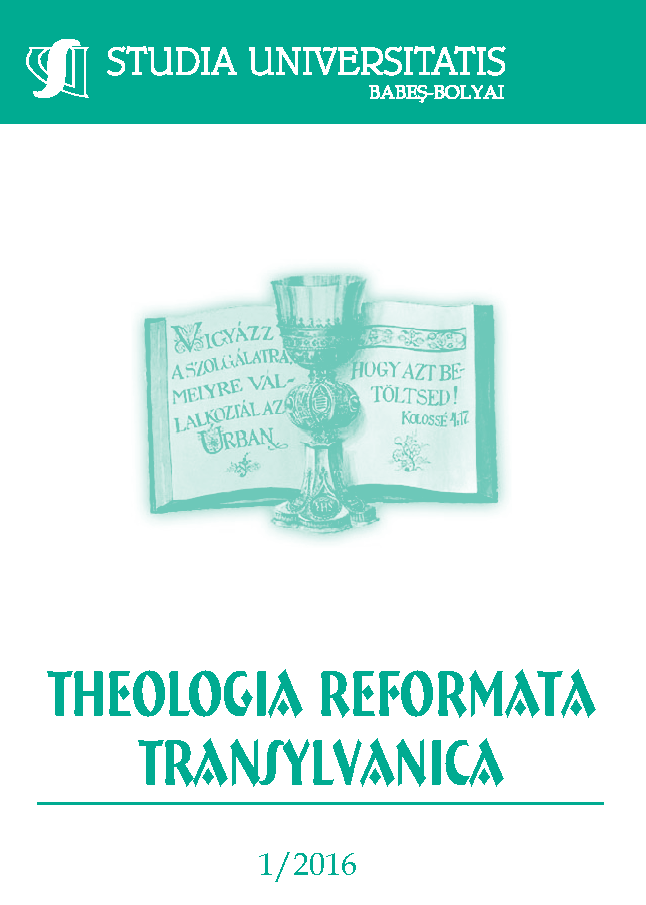II. Rákóczi Ferenc fejedelem egységtörekvési arculata és egyházpolitikájának újszerűsége
Keywords:
Prince Francis II Rákóczi, Catholic Church, “unio catholica”, Jesuit, Protestant Church.Abstract
Unity-Seeking Endeavors of Prince Francis II Rákóczi and the Novelty of his Church Policy.Francis II Rákóczi, the last Prince of Transylvania, has recognised the force that would have brought about results in suppressing the Habsburg rule in the reconciliation and unity of the churches of his country. He adjusted his religious policies to the interests of the fight for freedom, as well as his internal convictions. Moreover, the external factors have also justified the Protestant sympathies of the Hungarian diplomacy. Then, in the time of his exile, he found composure in God.
In the spring of 1703 he decided to launch an open armed attack against the House of Habsburg. Before the fight he wrote occasional prayers which his soldiers would pray. Francis II Rákóczi also wrote poems and it is his merit that some of the Kuruc songs are Catholic-spirited. The “Humble Prayer” radiates of truth-awareness, of the hope of divine grace and help. He wrote the morning prayer of the Noble Youth Association members in the same spirit. To this, he attached three psalm-translations by which he encouraged them to fight. According to Béla Köpeczi, Rákóczi wished to implement the “unio catholica” on political grounds, based on the works of Jacques Bénigne Bosseut. Rákóczi’s aim was the union indeed, but primarily in a theological sense, upon which he insisted throughout the fight for freedom. According to Sándor Bene, in Rákóczi’s view, the above concept did not mean the Catholic Church, but the Universal Church comprising all the denominations. A number of Rákóczi’s works deal with his church policy. The most widely known of them is the Latin Responsio (1706–1707) justifying the actions of the Kuruc confederation against the Jesuits. Rákóczi’s position concerning Jesuits can be summarized into three key aspects: Jesuits endanger the Catholic Church, science and education. In terms of knowledge, Rákóczi claimed that the conscious awareness of religion should stand first, in order to eliminate superstition and bigotry. Rákóczi’s 1704-decree “on the subject of religious tolerance” secured the freedom of education primarily with regard to the Hungarian language. In 1707 he finished the regulations of the “Nobles’ Association” on education and schooling of young nobles. Rákóczi was an insightful politician of his era, whose personality and approach towards his nation, as well as his church policy of reconciliation of religions influenced the next generations as well.
References
II. Rákóczi Ferenc Politikai és erkölcsi végrendelete. Budapest, 1984.
BADICS Ferencz: Rákóczi Ferenc buzgó éneke. In: Irodalmi Közlemények, 1927.
BENE Sándor: Az ellenállás hermeneutikája (...) a Rákóczi-szabadságharc politikai publicisztikájában. In: „Nem sűlyed az emberiség!”.... Album amicorum Szörényi László LX. születés-napjára. Budapest, MTA Irodalomtudományi Intézet, 2007.
BOROSI József: Rákóczi világnézetének vallásos vonatkozásai. In: BENDA Kálmán (szerk.): Európa és a Rákóczi-szabadságharc, Budapest, 1980. 300.
CSÓKA Gáspár, DÉRI Balázs (ford.): II. Rákóczi Ferenc fohászai. Budapest, Akadémiai Kiadó - Balassa Kiadó, 1994.
DÉZSI Lajos: Rákóczi imádsága. In: Századok, 1904.
ESZE Tamás: Rákóczi „Responsio”-ja. In: SZAUDER József, TARNAI Andor (szerk.): Irodalom és felvilágosodás, Tanulmányok. Budapest, 1974.
ESZE Tamás: Rákóczi valláspolitikája. In: BENDA Kálmán (szerk.): Európa és a Rákóczi-szabadságharc, Budapest, 1980.
FÁBINY Tibor: Rákóczi diplomáciájának egyházpolitikai vonatkozásai. In: BENDA Kálmán (szerk.): Európa és a Rákóczi-szabadságharc. Budapest, 1980.
FRAKNÓI Vilmos: II. Rákóczi Ferenc élete és munkái. In: Katholikus Szemle, 1904.
HOPP Lajos Utószava a Vallomások, emlékiratokhoz. Budapest, 1979.
KÖPECZI Béla, R. VÁRKONYI Ágnes: II. Rákóczi Ferenc. Budapest, 2003 (3).
KÖPECZI Béla: II. Rákóczi Ferenc politikai s erkölcsi végrendelete. Budapest, 1984.
LADÁNYI Sándor: A vallási türelem eszménye a Rákóczi-szabadságharcban. In: Rákóczi-szabadságharc. Budapest, 1980.
LUKÁCS Olga: II. Rákóczi Ferenc és a grosboisi kamalduliak. In: MUZSNAY Árpád (szerk.): Évfor-dulós tanácskozások. Szatmárnémeti, 2005.
LUKÁCS Olga: Vallás és nevelés egysége II. Rákóczi Ferenc életében és művelődéspolitikájában. In: „Istennel a hazáért és a szabadságért” DUKRÉT Géza (szerk.). Europaprint, 2011.
Ráday Pál iratai. II. kötet. Budapest, 1955.
RÁKÓCZI Ferenc: Emlékiratok. VAS István (ford.), HOPP Lajos (kiad.). Budapest, 1985.
RÁKÓCZI Ferenc: Vallomások, emlékiratok. Budapest, 1979.
RÁKÓCZI Ferenc: Vallomások. Bukarest, 1979.
SÖVEGES Dávid: Fejezetek a lelkiség történetéből. Pannonhalma, 1993.
SZEKFŰ GYula: A száműzött Rákóczi. Budapest, 1993.
Downloads
Published
How to Cite
Issue
Section
License
Copyright (c) 2016 Studia Universitatis Babeș-Bolyai Theologia Reformata Transylvanica

This work is licensed under a Creative Commons Attribution-NonCommercial-NoDerivatives 4.0 International License.






